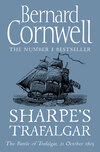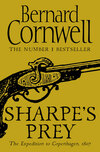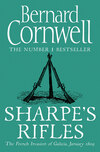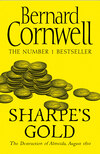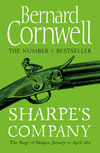Kitabı oku: «The Sharpe Series», sayfa 3
A woman was protesting loudly at the accommodation on the deck’s far side, while her husband was meekly asserting that they could afford no better. Two small children, hot and sweating, were bawling. A dog barked until it was silenced by a kick. Dust sifted from the overhead beam as a passenger in the main-deck steerage hammered in a staple or a nail. Goats bleated. The bilge pump clattered and sucked and gulped and spat filthy water into the sea.
Sharpe sat on the chest. There was just enough light for him to read the paper that Captain Chase had pressed on him. It was a letter of introduction to Chase’s wife at the captain’s house near Topsham in Devon. ‘Lord knows when I’ll see Florence and the children again,’ Chase had said, ‘but if you’re in the west country, Sharpe, do go and introduce yourself. The house ain’t much. A dozen acres, run-down stable block and a couple of barns, but Florence will make you welcome.’
No one else would, Sharpe thought, for no one waited for him in England; no hearth would blaze for his return and no family would greet him. But it was home. And, like it or not, he was going there.
CHAPTER TWO

That evening, when the last boats had delivered their passengers and baggage to the convoy, the Calliope’s bosun shouted for the topmen to go aloft. Thirty other seamen came to the lower deck and shipped the capstan bars, then began to trudge round and round, inching up the great anchor cable that came through the hawsehole, along the lower deck and down into the ship’s belly. The cable seeped a foul-smelling mud that two seamen ineffectually tried to wash overboard with pails of water, but much of the diluted mud swilled aft into the steerage compartments. The topsails were dropped, then the headsails were unfurled as the anchor came clear of the bottom and the ship’s head swung away from land as the mainsails were dropped. The steerage passengers were not allowed to leave their quarters until the sails were hoisted and Sharpe sat on his trunk listening to the rush of feet overhead, the scraping of ropes along the deck and the creak of the ship’s timbers. It was a half-hour after the anchor had been hauled that Binns, the young officer, shouted that the deck was clear, and Sharpe could go up the stairs to see that the ship had still not cleared the harbour. A red swollen sun, streaked by black clouds, hovered above the roofs and palm trees of Bombay. The scent of the land came strong. Sharpe leaned on the gunwale and stared at India. He doubted he would see it again and was sad to be leaving. The rigging creaked and the water gurgled down the ship’s side. On the quarterdeck, where the richer passengers took the air, a woman waved to the distant shore. The ship tilted to a stronger gust of wind and a cannon near Sharpe scraped on the deck until it was checked by its lashings.
The channel veered nearer the shore, taking the ship close to a temple with a brightly coloured tower carved with monkeys, gods and elephants. The big driver sail on the mizzen was just being loosed and its canvas slapped and cracked, then bellied with the wind to lean the ship further over. Behind the Calliope the other great ships of the convoy were turning away from the anchorage, showing white water at their stems and filling their high masts and tangled rigging with creamy yellow sails. An East India Company frigate that would escort the convoy as far as the Cape of Good Hope sailed just ahead of the Calliope. The frigate’s bright ensign, thirteen stripes of red and white with the union flag in the upper staff quadrant, streamed bright in the sun’s red glow. Sharpe looked for Captain Joel Chase’s ship, but the only Royal Navy vessel he could see was a small schooner with four cannon.
The Calliope’s seamen tidied the deck, stowing the loose sheets in wooden tubs and checking the lashings of the ship’s boats that were stored on the spare spars which ran like vast rafters between the quarterdeck and the forecastle. A dark-skinned man in a fishing canoe paddled out of the ship’s way, then gaped up at the great black and white wall that roared past him. The temple was fading now, lost in the glare of the sun, but Sharpe stared at the tower’s black outline and wished again that he was not leaving. He had liked India, finding it a playground for warriors, princes, rogues and adventurers. He had found wealth there, been commissioned there, fought in its hills and on its ancient battlements. He was leaving friends and lovers there, and more than one enemy in his grave, but for what? For Britain? Where no one waited for him and no adventurers rode from the hills and no tyrants lurked behind red battlements.
One of the wealthy passengers came down the steep steps from the quarterdeck with a woman on his arm. Like most of the Calliope’s passengers he was a civilian and was elegantly dressed in a long dark-green coat, white breeches and an old-fashioned tricorne. The woman on his arm was plump, dressed in gauzy white, fair-haired, and laughing. The two spoke a foreign language, one Sharpe did not know. German? Dutch? Swedish? Everything the foreign couple saw, from the lashed guns to the crates of hens to the first seasick passengers leaning over the rail, amused them. The man was explaining the ship to his companion. ‘Boom!’ he cried, pointing to one of the guns, and the woman laughed, then staggered as a gust of wind made the big ship lurch. She whooped in mock alarm and clung to the man’s elbow as they staggered on forrard.
‘Know who that is?’ It was Braithwaite, Lord William Hale’s secretary, who had sidled alongside Sharpe.
‘No.’ Sharpe was brusque, instinctively disliking anyone connected with Lord William.
‘That was the Baron von Dornberg,’ Braithwaite said, evidently expecting Sharpe to be impressed. The secretary watched the baron help his lady up to the forecastle where another gust of wind threatened to snatch her wide-brimmed hat.
‘Never heard of him,’ Sharpe said churlishly.
‘He’s a nabob.’ Braithwaite spoke the word in awe, meaning that the baron was a man who had made himself fabulously rich in India and was now carrying his wealth back to Europe. Such a career was a gamble. A man either died in India or became wealthy. Most died. ‘Are you carrying goods?’ Braithwaite asked Sharpe.
‘Goods?’ Sharpe asked, wondering why the secretary was making such an effort to be pleasant to him.
‘To sell,’ Braithwaite said impatiently, as though Sharpe was being deliberately obtuse. ‘I’ve got peacock feathers,’ he went on, ‘five crates! The plumes fetch a rare price in London. Milliners buy them. I’m Malachi Braithwaite, by the way.’ He held out his hand. ‘Lord William’s confidential secretary.’
Sharpe reluctantly shook the offered hand.
‘I never did send that letter,’ Braithwaite said, smiling meaningfully. ‘I told him I did, but I didn’t.’ Braithwaite leaned close to make these confidences. He was a few inches taller than Sharpe, but much thinner, and had a lugubrious face with quick eyes that never seemed to look at Sharpe for long before darting sideways, almost as though Braithwaite expected to be attacked at any second. ‘His lordship will merely assume your colonel never received the letter.’
‘Why didn’t you send it?’ Sharpe asked.
Braithwaite looked offended at Sharpe’s curt tone. ‘We’re to be shipmates,’ he explained earnestly, ‘for how long? Three, four months? And I don’t travel in the stern like his lordship, but have to sleep in the steerage, and lower steerage at that! Not even main-deck steerage.’ He plainly resented that humiliation. The secretary was dressed as a gentleman, with a fashionable high stock and an elaborately tied cravat, but the cloth of his black coat was shiny, the cuffs were frayed and the collar of his shirt was darned. ‘Why should I make unnecessary enemies, Mister Sharpe?’ Braithwaite asked. ‘If I scratch your back, then maybe you can do me a service.’
‘Such as?’
Braithwaite shrugged. ‘Who knows what eventuality might arise?’ he asked airily, then turned to watch the Baron von Dornberg come back down the forecastle steps. ‘They say he made a fortune in diamonds,’ Braithwaite murmured to Sharpe, ‘and his servant isn’t expected to travel in steerage, but has a place in the great cabin.’ He spat that last information, then composed his face and stepped forward to intercept the baron. ‘Malachi Braithwaite, confidential secretary to Lord William Hale,’ he introduced himself as he raised his hat, ‘and most honoured to meet your lordship.’
‘The honour and pleasure are entirely mine,’ the Baron von Dornberg answered in excellent English, then returned Braithwaite’s courtesy by removing his tricorne hat and making a low bow. Straightening, he looked at Sharpe and Sharpe found himself staring into a familiar face, though now that face was decorated with a big waxed moustache. He looked at the baron, and the baron looked astonished for a second, then recovered himself and winked at Sharpe.
Sharpe wanted to say something, but feared he would laugh aloud and so he simply offered the baron a stiff nod.
But von Dornberg would have none of Sharpe’s formality. He spread his powerful arms and gave Sharpe a bear-like embrace. ‘This is one of the bravest men in the British army,’ he told his woman, then whispered in Sharpe’s ear. ‘Not a word, I beg you, not a pippy squeak.’ He stepped back. ‘May I name the Baroness von Dornberg? This is Mister Richard Sharpe, Mathilde, a friend and an enemy from a long time ago. Don’t tell me you travel in steerage, Mister Sharpe?’
‘I do, my lord.’
‘I am shocked! The British do not know how to treat their heroes. But I do! You shall come and dine with us in the captain’s cuddy. I shall insist on it!’ He grinned at Sharpe, offered Mathilde his arm, inclined his head to Braithwaite and walked on.
‘I thought you said you didn’t know him!’ Braithwaite said, aggrieved.
‘I didn’t recognize him with his hat on,’ Sharpe said. He turned away, unable to resist a grin. The Baron von Dornberg was no baron, and Sharpe doubted he had traded for any diamonds, no matter how many he carried, for von Dornberg was a rogue. His true name was Anthony Pohlmann and he had once been a sergeant in the Hanoverian army before he deserted for the richer service of an Indian prince, and his talent for war had brought him ever swifter promotion until, for a time, he had led a Mahratta army that was feared throughout central India. Then, one hot day, his forces met a much smaller British army between two rivers at a village called Assaye, and there, in an afternoon of dusty heat and red-hot guns and bloody slaughter, Anthony Pohlmann’s army had been shredded by sepoys and Highlanders. Pohlmann himself had vanished into the mystery of India, but now he was here on the Calliope as a celebrated passenger.
‘How did you meet him?’ Braithwaite demanded.
‘Can’t remember now,’ Sharpe said vaguely. ‘Somewhere or other. Can’t really remember.’ He turned to stare at the shore. The land was black now, punctured by sparks of firelight and outlined by a grey sky smeared with a city’s smoke. He wished he was back there, but then he heard Pohlmann’s loud voice and turned to see the German introducing his woman to Lady Grace Hale.
Sharpe stared at her ladyship. She was above him, on the quarterdeck, seemingly oblivious of the folk crowded on the main deck below. She offered Pohlmann a limp hand, inclined her head to the fair-haired woman and then, without a word, turned regally away. ‘That is Lady Grace,’ Braithwaite told Sharpe in an awed voice.
‘Someone told me she was ill?’ Sharpe suggested.
‘Merely highly strung,’ Braithwaite said defensively. ‘Very fine-strung women are prone to fragility, I think, and her ladyship is fine-strung, very fine-strung indeed.’ He spoke warmly, unable to take his eyes from Lady Grace, who stood watching the receding shore.
An hour later it was dark, India was gone and Sharpe sailed beneath the stars.
‘The war is lost,’ Captain Peculiar Cromwell declared, ‘lost.’ He made the statement in a harsh, flat voice, then frowned at the tablecloth. It was the Calliope’s third day out from Bombay and she was running before a gentle wind. She was, as Captain Chase had told Sharpe, a fast ship and the East India Company frigate had ordered Cromwell to shorten sail during the day because she was in danger of outrunning the slower ships. Cromwell had grumbled at the order, then had taken so much canvas from the yards that the Calliope now sailed at the convoy’s rear.
Anthony Pohlmann had invited Sharpe to take supper in the cuddy where Captain Cromwell nightly presided over those wealthier passengers who had paid to travel in the luxurious stern cabins. The cuddy was in the poop, the highest part of the ship, just forward of the two roundhouse cabins that were the largest, most lavish and most expensive. Lord William Hale and the Baron von Dornberg occupied the roundhouse, while beneath them, on the main deck of the ship, the great cabin had been divided into four compartments for the ship’s other wealthy passengers. One was a nabob and his wife who returned to their Cheshire home after twenty profitable years in India, another was a barrister who had been travelling after practising in the Supreme Court in Bengal, the third was a grey-haired major from the 96th who was retiring from the army, while the last cabin belonged to Pohlmann’s servant who alone among the stern passengers was not invited to eat in the cuddy.
It was the Scottish major, a stocky man called Arthur Dalton, who frowned at Peculiar Cromwell’s declaration that the war was lost. ‘We’ve beaten the French in India,’ the major protested, ‘and their navy is on its knees.’
‘If their navy is on its knees,’ Cromwell growled, ‘why are we sailing in convoy?’ He stared belligerently at Dalton, waiting for an answer, but the major declined to take up the cudgels and Cromwell looked triumphantly about the cuddy. He was a tall and heavy-set man with black hair streaked badger white that he wore past his shoulders. He had a long jaw, big yellow teeth and belligerent eyes. His hands, large and powerful, were permanently blackened from the tarred rigging. His uniform coat was cut from a thick blue broadcloth and heavily crusted with brass buttons decorated with the Company’s symbol which was supposed to show a lion holding a crown, but which everyone called ‘the cat and the cheese’. Cromwell shook his ponderous head. ‘The war is lost,’ he declared again. ‘Who rules the continent of Europe?’
‘The French,’ the barrister answered lazily, ‘but it won’t last. All flash and fire, the French, but there ain’t no substance in them. No substance at all.’
‘The whole coast of Europe,’ Cromwell said icily, ignoring the lawyer’s scorn, ‘is in enemy hands.’ He paused as a shuddering, grating and scraping noise echoed through the cabin. It punctuated the conversation sporadically and it had taken Sharpe a few moments to realize that it was the sound of the tiller ropes that ran two decks beneath him. Cromwell glanced up at a telltale compass that was mounted on the ceiling, then, deciding all was in order, resumed his argument. ‘Europe, I tell you, is in enemy hands. The Americans, damn their insolence, are hostile, so our home ocean, sir, is an enemy sea. An enemy sea. We sail there because we have more ships, but ships cost money, and for how long will the British people pay for ships?’
‘There are the Austrians,’ Major Dalton suggested, ‘the Russians?’
‘The Austrians, sir!’ Cromwell scoffed. ‘No sooner do the Austrians field an army than it is destroyed! The Russians? Would you trust the Russians to free Europe when they cannot liberate themselves? Have you been to Russia, sir?’
‘No,’ Major Dalton admitted.
‘A land of slaves,’ Cromwell said derisively.
Lord William Hale might have been expected to contribute to this conversation for, as one of the six members of the East India Company’s Board of Control, he must have been familiar with the thinking of the British government, but he was content to listen with a faintly amused smile, though he did raise an eyebrow at Cromwell’s assertion that the Russians were a nation of slaves.
‘The French, sir,’ Cromwell went on hotly, ‘face a rabble of enemies on their eastern frontiers, but none on their west. They can therefore concentrate their armies, sure in the knowledge that no British army will ever touch their shore.’
‘Never?’ the merchant, a solid man called Ebenezer Fairley, asked sarcastically.
Cromwell swung his heavy gaze on this new opponent. He contemplated Fairley for a while, then shook his head. ‘The British, Fairley, do not like armies. They keep a small army. A small army can never defeat Napoleon. Ergo, Napoleon is safe. Ergo, the war is lost. Good God, man, they might already have invaded Britain!’
‘I pray not,’ Major Dalton said fervently.
‘Their army was ready,’ Cromwell boomed with a strange relish in this talk of British defeat, ‘and all they needed was for their navy to command the channel.’
‘Which it cannot do,’ the barrister intervened quietly.
‘And even if they did not invade this year,’ Cromwell went on, ignoring the lawyer, ‘then in time they will succeed in building a navy fit to defeat ours, and when that day comes Britain will have to seek peace. Britain will revert to its natural posture, and its natural posture is to be a small and insignificant island poised off a great continent.’
Lady Grace spoke for the first time. Sharpe had been pleased and surprised to see her at supper, for Captain Chase had suggested that she eschewed company, but she seemed content to be in the cuddy though so far she had taken as little part in the conversation as her husband. ‘So we are doomed to defeat, Captain?’ she suggested.
‘No, ma’am,’ Cromwell answered, softening his pugnacity now that he addressed a titled passenger. ‘We are doomed to a realistic settlement of peace just as soon as the jackanapes politicians recognize what is plain in front of their faces.’
‘Which is?’ Fairley demanded.
‘That the French are more powerful than us, of course!’ Cromwell growled. ‘And until we make peace the prudent man makes money, for we shall need money in a world run by the French. That is why India is important. We should suck the place dry before the French take it from us.’ Cromwell snapped his fingers to instruct the stewards to remove the plates which had held a ragout of salted beef. Sharpe had eaten clumsily, finding the thick silverware unwieldy, and wishing he had dared take out his folding pocket knife which he used at meals when his betters were not present.
Mathilde, the Baroness von Dornberg, smiled gratefully as the captain replenished her wine glass. The baroness, who was almost certainly nothing of the sort, sat on Captain Cromwell’s left while opposite her was Lady Grace Hale. Pohlmann, resplendent in a lace-fringed silk coat, sat next to Lady Grace while Lord William was to the left of Mathilde. Sharpe, as the least important person present, was at the lower end of the table.
The cuddy was an elegant room panelled with wood that had been painted pea-green and gold, while a brass chandelier, bereft of candles, hung from a beam alongside the wide skylight. If the room had not been gently rocking, sometimes shifting a wine glass on the table, Sharpe might have thought himself ashore.
He had said nothing all evening, content to gaze at Lady Grace who, white-faced and aloof, had ignored him since the moment he had been named to her. She had politely offered him a gloved hand, given him an expressionless glance, then turned away. Her husband had frowned at Sharpe’s presence, then imitated his wife by pretending the ensign did not exist.
A dessert of oranges and burnt sugar was served. Pohlmann eagerly spooned the rich sauce into his mouth, then looked at Sharpe. ‘You think the war is lost, Sharpe?’
‘Me, sir?’ Sharpe was startled at being addressed.
‘You, Sharpe, yes, you,’ Pohlmann said. ‘Do you think the war is lost?’
Sharpe hesitated, wondering whether the wisest course was to say something harmless and let the conversation go on again without him, but he had been offended by Cromwell’s defeatism. ‘It certainly isn’t over, my lord,’ he said to Pohlmann.
Cromwell recognized the challenge. ‘What do you mean by that, sir, eh? Explain yourself.’
‘A fight ain’t lost till it’s finished, sir,’ Sharpe said, ‘and this one ain’t done.’
‘An ensign speaks,’ Lord William murmured scornfully.
‘You think a rat has a chance against a terrier?’ Cromwell demanded, just as scornfully.
Pohlmann held up a hand to stop Sharpe from responding. ‘I think Ensign Sharpe knows a good deal about fighting, Captain,’ the German said. ‘When I first met him he was a sergeant, and now he is a commissioned officer.’ He paused, letting that statement cause its stir of surprise. ‘What does it take for a sergeant to become an officer in the British army?’
‘Damned luck,’ Lord William said laconically.
‘It takes an act of outstanding bravery,’ Major Dalton observed quietly. He raised his wine glass to Sharpe. ‘Honoured to make your acquaintance, Sharpe. I didn’t place the name when we were introduced, but I recall you now. I’m honoured.’
Pohlmann, enjoying his mischief, toasted Sharpe with a sip of wine. ‘So what was your act of outstanding bravery, Mister Sharpe?’
Sharpe reddened. Lady Grace was staring at him, the first notice she had taken of him since the company had sat to dinner.
‘Well, Sharpe?’ Captain Cromwell insisted.
Sharpe was tongue-tied, but was rescued by Dalton. ‘He saved Sir Arthur Wellesley’s life,’ the major said quietly.
‘How? Where?’ Pohlmann demanded.
Sharpe caught the German’s eye. ‘At a place called Assaye, sir.’
‘Assaye?’ Pohlmann said, frowning slightly. It had been at Assaye that his army and his ambitions had been wrecked by Wellesley. ‘Never heard of it,’ he said lightly, leaning back in his chair.
‘And you were first over the wall at Gawilghur, Sharpe,’ the major said. ‘Isn’t that right?’
‘Me and Captain Campbell were first across, sir. But it were lightly defended.’
‘Is that where you fetched the scar, Sharpe?’ the major enquired, and the whole table gazed at Sharpe. He looked uncomfortable, but there was no denying the power of his face, nor the suggestion of violence that was contained in the scar. ‘It wasn’t a bullet, was it?’ the major insisted. ‘No bullet makes that kind of scar.’
‘It were a sword, sir,’ Sharpe answered. ‘Man called Dodd.’ He looked at Pohlmann as he spoke and Pohlmann, who had once commanded and heartily disliked the renegade Dodd, half smiled.
‘And does Mister Dodd still live?’ the German asked.
‘He’s dead, sir,’ Sharpe said flatly.
‘Good.’ Pohlmann raised his glass to Sharpe.
The major turned to Cromwell. ‘Mister Sharpe is a very considerable soldier, Captain. Sir Arthur told me that if you find yourself in a bad fight then you can ask for no one better at your side.’
The news that General Wellesley had said any such thing pleased Sharpe, but Captain Cromwell had not been deflected from his argument and was now frowning at the ensign. ‘You think,’ the captain demanded, ‘that the French can be defeated?’
‘We’re at war with them, sir,’ Sharpe retorted, ‘and you don’t go to war unless you mean to win.’
‘You go to war,’ Lord William said icily, ‘because small-minded men can see no alternative.’
‘And if every war has a winner,’ Cromwell said, ‘it must by ineluctable logic also have a loser. If you want my advice, young man, leave the army before some politician has you killed in an ill-considered attack on France. Or, more likely, the French invade Britain and kill you along with the rest of the redcoats.’
The ladies withdrew a short while later and the men drank a glass of port, but the atmosphere was stiff and Pohlmann, plainly bored, excused himself from the company and gestured that Sharpe should follow him back to the starboard roundhouse cabin where Mathilde was now sprawled on a silk-covered sofa. Facing her on a matching sofa was an elderly man who was talking animatedly in German when Pohlmann entered, but who immediately stood and bowed his head respectfully. Pohlmann seemed surprised to see him and gestured the man to the door. ‘I won’t need you tonight,’ he said in English.
‘Very good, my lord,’ the man, evidently Pohlmann’s servant, answered in the same language, then, with a glance at Sharpe, left the cabin. Pohlmann peremptorily ordered Mathilde to take some air on the poop, then, when she had gone, he poured two large brandies and gave Sharpe a mischievous grin. ‘My heart,’ he said, clasping a dramatic hand to his breast, ‘almost flopped over and died when I first saw you.’
‘Would it matter if they knew who you were?’ Sharpe asked.
Pohlmann grinned. ‘How much credit will merchants give Sergeant Anthony Pohlmann, eh? But the Baron von Dornberg! Ah! They queue to give the baron credit. They trip over their fat feet to pour guineas into my purse.’
Sharpe looked about the big cabin that was furnished with two sofas, a sideboard, a low table, a harp and an enormous teak bed with ivory inlays on the headboard. ‘But you must have done well in India,’ Sharpe said.
‘For a former sergeant, you mean?’ Pohlmann laughed. ‘I do have some loot, my dear Sharpe, but not as much as I would have liked and nowhere near as much as I lost at Assaye, but I cannot complain. If I am careful I shall not need to work again.’ He looked at the hem of Sharpe’s red coat where the jewels made small lumps in the threadbare cloth. ‘I see you did well in India too, eh?’
Sharpe was aware that the fraying, thinning cloth of his coat was increasingly an unsafe place to hide the diamonds, emeralds and rubies, but he did not want to discuss them with Pohlmann so gestured at the harp instead. ‘You play?’
‘Mein Gott, no! Mathilde plays. Very badly, but I tell her it is wonderful.’
‘She’s your wife?’
‘Am I a numbskull? A blockhead? Would I marry? Ha! No, Sharpe, she was whore to a rajah and when he tired of her I took her over. She is from Bavaria and wants babies, so she is a double fool, but she will keep my bed warm till I see home and then I shall find something younger. So you killed Dodd?’
‘Not me, a friend killed him.’
‘He deserved to die. A very horrid man.’ Pohlmann shuddered. ‘And you? You travel alone?’
‘Yes.’
‘In the rat hole, eh?’ He looked at the hem of Sharpe’s coat. ‘You keep your jewels until you reach England and travel in steerage. But more important, my cautious friend, will you reveal who I am?’
‘No,’ Sharpe said with a smile. The last time he had seen Pohlmann the Hanoverian had been hiding in a peasant’s hut in the village of Assaye. Sharpe could have arrested him and gained credit for capturing the commander of the beaten army, but he had always liked Pohlmann and so he had looked the other way and let the big man escape. ‘But I reckon my silence is worth something, though,’ Sharpe added.
‘You want Mathilde every other Friday?’ Pohlmann, assured that his secret was safe with Sharpe, could not hide his relief.
‘A few invitations to supper, perhaps?’
Pohlmann was surprised by the modesty of the demand. ‘You so like Captain Cromwell’s company?’
‘No.’
Pohlmann laughed. ‘Lady Grace,’ he said softly. ‘I saw you, Sharpe, with your tongue lolling like a dog. You like them thin, do you?’
‘I like her.’
‘Her husband doesn’t,’ Pohlmann said. ‘We hear them through the partition.’ He jerked his thumb at the wall which divided the big roundhouse. The bulkhead was made from thin wooden panelling which could be struck down into the hold if only one passenger travelled in the lavish quarters. ‘The captain’s steward tells me their cabin is twice as big as this one and divided into two. He has one part and she the other. They are like, what do you say? Dog and cat?’
‘Cat and dog,’ Sharpe said.
‘He barks and she hisses. Still, I wish you joy. The gods alone know what they must make of us. They probably think we are bull and cow. Shall we join Mathilde on deck?’ Pohlmann took two cigars from the side-board. ‘The captain says we should not smoke on board. We must chew tobacco instead, but he can roger himself.’ He lit the cigars, handed one to Sharpe and then led him out onto the quarterdeck and up the stairs to the poop deck. Mathilde was standing at the rail, staring down at a seaman who was lighting the lamp in the binnacle, the only light which was allowed on the ship after dark, while Lady Grace was at the taffrail, standing beneath the huge stern lantern that would not be lit on this voyage so long as there was a danger of the Revenant or another French ship seeing the convoy. ‘Go and talk to her.’ Pohlmann leered, digging an elbow into Sharpe’s ribs.
‘I’ve got nothing to say to her.’
‘So you are not really brave after all,’ Pohlmann said. ‘I dare say you wouldn’t think twice about charging a line of guns like those I had at Assaye, but a beautiful woman makes you shiver, yes?’
Lady Grace stood solitary and slim, wrapped in a cloak. A maid attended her, but the girl stood at the side of the deck as though she was nervous of her ladyship. Sharpe was also nervous. He wanted to talk to her, but he knew he would stumble over his words, so instead he stood beside Pohlmann and stared forrard past the great bulk of the sails to where the rest of the convoy was just visible in the gathering night. Far forrard, on the fo’c’sle, a violin was being played and a group of sailors danced the hornpipe.
‘Were you really promoted from the ranks?’ a cold voice asked and Sharpe turned to see that Lady Grace had appeared at his side.
